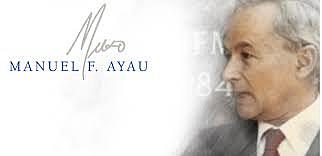The Intellectual Portrait Series: A Conversation with Manuel Ayau
Manuel Ayau is the founder and former rector and teacher of economics at Universidad Francisco Marroquin. Begun as an alternative to the prevailing statist views of higher education in Guatemala, Francisco Marroquin is now regarded as that country’s finest university. In addition to being a successful businessman, Ayau is a former Chairman of the Guatemala Stock Exchange, was a member of the Guatemala House of Representatives, and served as President of the Mont Pelerin Society. After meeting him in 1979, Ronald Reagan described Ayau as “one of the few people in the high political sphere who understands what is going on down there.”
Watch the video on our YouTube channel.
Below are some prompts for further conversation.

by Audrey F. Sullivan
6:00 Early Influences
I-Why did Ayau become so passionate about advocating for individual liberties, especially in Guatemala?
II- Ayau says that most of Latin America has functioned under what Adam Smith called ‘mercantilism.’ What does this mean? Why does he dislike mercantilism? Who were some of Ayau’s other influences, and what did he take from them?
III- What was the goal of the Center of Social and Economic Studies? Who helped get CSES running, and how successful have their efforts been?
IV- What were the principles that Ayau thought were the most important for people to know? How did this influence the structure of the university he was planning to create?
17:00 Universidad Francisco Marroquin
V- Why did Ayau (and other entrepreneurs) feel the need to spread ideas of classical liberalism through a university? What was the goal of this university? How do you think universities created by entrepreneurs wouuld compare to traditional universities?
VI- What is the influence of law at the Universidad Francisco Marroquin? Why does Ayau put so much emphasis on the importance of the teaching of law? Why are law and economics so important to the creation and maintenance of a free society?
VII- What has been the state of the relationship between the university and professors who did not hold explicitly classical liberal ideologies? What does UFM believe about the relationship of class size to the quality of education one student may receive? How does this compare with your own experience?
44:00 Economic Views
VIII- Ayau says, “The free society is not a zero sum game.” What does he mean by this, and what other term does he associate with this? Why is this such a central idea to individual liberty, free trade, and capitalism?
IX- What does Ayau say of business men and their views on free society and free trade? He says, “To earn a buck you have to increase the wealth of somebody else.” What does this mean? How does this relate to the idea of comparative advantage?
X- What does Ayau have to say about markets? Has anyone successfully NOT used a market? How do communism and socialism go against such an idea? How does this reflect the goals of the Universidad Francisco Marroquin’s business school?
53:00 Stint in Politics
XI- What was Ayau’s experience in politics like? How has the environment of Guatemalan plitics changed according to Ayau?
XII- What are some of the barriers that still stand in the way of classical liberal thought in Guatemala? What about the understanding of the free society?
XIII- Explain some of the bigger issues facing a free and responsible society in Guatemala that Ayau discusses. What does Ayau see as promising aspects?
XIV- How does Ayau explain globalization and the progression of it in the past few decades? Describe his views on environmentalism and anti-globalization? To what extent are you in agreement with Ayau?
The Intellectual Portrait Series: A Conversation with Manuel Ayau (Indianapolis: Liberty Fund, 2001).